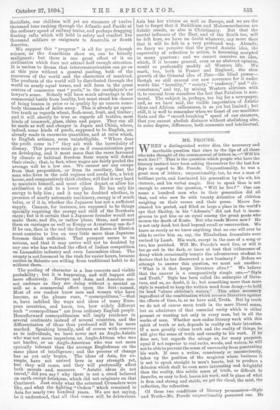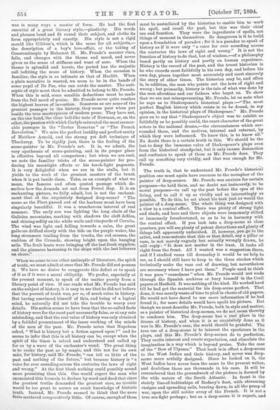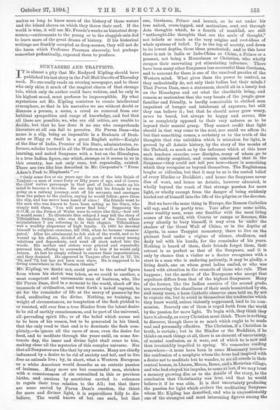MR. FROUDE.
WHEN a distinguished writer dies, the necessary and inevitable question that rises to the lips of all those who take thought of the commonweal of letters is,—" Will his work live ? " That is the question which people who have the literary instinct have been asking themselves for the last few days in regard to Mr. Fronde. Unquestionably, he was a great man of letters ; unquestionably, too, he was a man of brilliant parts, and fascinated his generation by his wit, his rhetoric, and his verbal magic. But to speak thus is not enough to answer the question, "Will he live ? " One can name a hundred men who in their generation did all that, and who now lie with twenty Atlantics of oblivion weighing on their verses and their prose. Moore fas- cinated his period, and filled so large a place in the world's eye that Shelley, in his "Adonais," did not feel it incon- gruous to put him as an equal among the great poets who mourn the death of Keats. But who reads Moore now? He is not only dead, but dead beyond recall or resurrection. We know as surely as we know anything that no one will ever be able to revive him as, say, the Elizabethan dramatists were revived by Lamb. His work, except in the case of a song or two, has perished. Will Mr. Froude's work live, or *will it too go out in the dark, or leave at best that iridescence of decay which occasionally tempts the adventurous student to declare that he has discovered a new luminary ? Before we attempt to answer this question, we must ask another "What is it that keeps literature alive ?" We believe that the answer is a comparatively simple one,—" Style and Truth." Style has been called the antiseptic of litera- ture, and so, no doubt, it is ; but something more than mere style is wanted to keep the written word from decay,—to hold its head "above oblivion's waters." This other necessary ingredient of the combination which secures literature against the effects of time, is, as we have said, Truth. But by truth we do not of course mean truth in the mere literal sense, but an admixture of that essential verity which is either present or wanting not only in every man, but in all the works of man. Whether men endue literary work with this spirit of truth or not, depends in reality on their intention. If a man greatly values truth and the reality of things, he will give the sense of truth and veracity to his work. If he does not, but regards the mirage as, for many purposes, equal if not superior to real rocks, woods, and waters, he will not be able to prevent the sense of =veracity from penetrating his work. If once a writer, consciously or unconsciously, takes up the position of the magician whose business it is not to speak straight to men's hearts, but to produce a delusion which shall be even more interesting and delightful than the reality, this subtle sense of truth, so difficult to describe, so easy to feel, leaves his work, and in place of what is firm and strong and stable, we get the cloud, the mist, the reflection, the refraction.
Of these two conditions of literary permanence—Style and Truth—Mr. Fronde unquestionably possessed one. He was in many ways a master of form. He had the first essential of a great literary style,—plasticity. His words and phrases bend and fit round their subject, and clothe its form appropriately and exactly. His style is not a rigid mould like Gibbon's, which is the same for all subjects,— the description of a boy's love-affair, or the taking of Constantinople by Mahomet II. Mr. Froude's manner rises, falls, and changes with the theme and mood, and never gives us the sense of stiffness and want of ease. When the theme is splendid and heroic, the period has the majestic roll befitting the muse of history. When the occasion is familiar, the style is as intimate as that of Hazlitt. When a plain narrative is wanted, we seem to be in the hand's of some pupil of De Foe, who can outdo the master. The anti- septic of style must then be admitted to belong to Mr. Fronde. When this is said, some sensible deductions must be made from the full meed of praise. Mr. Froude never quite reaches the highest heaven of invention. Sonorous as are some of the greatest passages in the history, they seem poor when put beside the true masterpieces of modern prose. They have not, on the one hand, the clear bell-like note of Newman, or, on the other, the passion with which Carlyle saturated the most memor- able passages in the " Sartor Resartus " or "The French Revolution." We miss the perfect lucidity and perfect sanity of Matthew Arnold, and the strong yet deft technique of Thackeray. To be rigidly just, there is the feeling of the scene-painter in Mr. Froude's art. It is, we admit, the very apotheosis of scene-painting, and in its proper place is effective beyond all comparison ; but when we are cool, we note the familiar tricks of the scene-painter for pro- ducing his moonlight effects or his torch-light pageants. It is very delightful when we are in the stalls, but it yields to the work of the greatest masters of the brush when it is put beside them. Take, as an example of what we mean, the famous and often quoted passage which de- scribes how the Armada set sail from Ferrol Bay. It is an enchanting picture, we fully admit, but is not the enchant- ment that of the exquisitely designed drop-scene P "The scene as the Fleet passed out of the harbour must have been singularly beautiful. It was a treacherous interval of real summer. The early sun was lighting the long chain of the Galician mountains, marking with shadows the cleft defiles, and shining softly on the white walls and vineyards of Coruiia. The wind was light and falling towards a calm, the great galleons drifted slowly with the tide on the purple water, the long streamers trailing from the trucks, the red crosses, the emblem of the Crusade, showing bright upon the hanging sails. The fruit boats were bringing off the last fresh supplies, and the pinnaces hastening to the ships with the last loiterers on shore."
When we come to our other antiseptic of literature, the spirit of truth, we must admit at once that Mr. Froude did not possess it. We have no desire to exaggerate this defect or to speak of it as if it were a moral obliquity. We prefer, especially at the present moment, to speak of the matter purely from a literary point of view. If one reads what Mr. Fronde has said on the subject of history, it is easy to see that he did not believe that the pursuit of truth was, per se, of much value in history. But having convinced himself of this, and being of a logical mind, he naturally did not take the trouble to worry over details. His notion seems to have been that the so-called facts of history were for the most part necessarily false, or at any rate misleading, and that the real value of history was only obtained by a faithful presentment of the inner working of the minds of the men of the past. Mr. Fronde notes that Napoleon asked, 'What is history but a fiction agreed upon ? " and he seems to infer that this is all history can be, except when the spirit of the times is seized and understood and caned up for us by a wave of the enchanter's wand. The great thing is to evoke the past as by magic, and this not for its own sake, for history, said Mr. Fronde, "can tell us little of the past and nothing of the future," but because history is "a voice for ever sounding across the centuries the laws of right and wrong." At the first blush nothing could possibly sound more promising than this. One would expect the man who enunciated this formula to declare by word and deed that since the greatest truths demanded the greatest care, no trouble would be too great to secure an exact knowledge of historic truth. Instead, Mr. Fronde seemed to think that the mere facts mattered comparatively little. Of course, enough of them must be assimilated by the historian to enable him to work his spell, and recall the past, but this was their chief use and function. They were the ingredients of spells, not things of moment in themselves. So dangerous is it to build upon a foundation of paradox ; for it is a paradox to speak of history as if it were only "a voice for ever sounding across the centuries the laws of right and wrong." It is not the function of history to do that, but of wisdom,—of a philosophy based partly on history and partly on human experience. History is the record of the past, and the truest historian is he who records most faithfully in his own day, and before his own day, pieces together most accurately and most sincerely the story of other times. The historian may be, and often is, in addition, the man who points out the laws of right and wrong ; but primarily, history is the tale of what was done by the men aforetime and our fathers who begot us. To show that we are not misrepresenting Mr. Fronde, let us note what he says as to Shakespeare's historical plays :—" The most perfect English history which exists is to be found, in my opinion, in the historical plays of Shakespeare." Mr. Froude goes on to say that "Shakespeare's object was to exhibit as faithfully as he possibly could, the exact character of the great actors in the national drama,—the circumstances which sur- rounded them, and the motives, internal and external, by which they were influenced. To know this, is to know all." No doubt there is a certain truth in this. We should be the last to deny the immense value of Shakespeare's plays even from the historical standpoint, but it only causes distraction and confusion to speak of them as Mr. Fronde does. They call up something very vividly, and that was enough for Mr. Fronde.
The truth is, that to understand Mr. Froude's historic-al position one must again have recourse to the metaphor of the painter of drop-scenes. Mr. Fronde was anxious for certain purposes—he held them, and no doubt not insincerely, to be moral purposes—to call up the past before the eyes of the living, and to call it up as vividly and as interestingly as possible. To do this, he set about his task just as would the painter of a drop-scene. The whole thing was designed with a view to a central effect. There was plenty of strong light and shade, and here and there objects were immensely stilted or immensely foreshortened, so as to be in harmony with the central effect. If you look into a drop-scene at close quarters, you will see plenty of patent distortions and plenty of things left apparently unfinished. If, however, you go to the artist, and remonstrate that this or that detail, say a pillar or vase, is not merely vaguely but actually wrongly drawn, he will reply: "It does not matter in the least. It looks all right from the front. All I wanted was a suggestion there, and if I studied vases till doomsday it would be no help to me, as I should still have to keep to the three strokes which technically make the vase out of drawing, but nevertheless are necessary where I have put them." People used to think it was pure " cussedness " when Mr. Fronde would not wade through the Spanish archives or bury himself in the Cecil papers at Hatfield. It was nothing of the kind. He worked hard till he had got the material for his drop-scene perfect. That done, it was merely waste of time to plod in chests of old papers. He would not have dared to use more information if he had found it; for more details would have spoilt his picture. But though we must describe Mr. Fronde, both in style and matter, as a painter of historical drop-scenes, we do not mean thereby to condemn him. The drop-scene has a real place in the drama of history, and when it is so exquisitely done as it was in Mr. Froude's case, the world should be grateful. The true use of a drop-scene is to interest the spectators in the plays, and this Mr. Froude's drop-scenes do to perfection. They excite interest and create expectation, and stimulate the imagination in a way which is beyond praise. Take the ease of the "Bow of Ulysses." That book is in effect a drop-scene to the West Indies and their history, and never was drop. scene more artfully designed. Since he looked on it, the West Indies have never been the same to the present writer, and doubtless there are thousands in his case. It will be remembered that the groundwork of the picture is formed by the wide waters of the South Atlantic. In front is the stately line-of-battleships of Rodney's fleet, with streaming ensigns and spreading sails, bearing down, in all the pomp of war, upon the still nobler array of the French. It is not a true sea-fight perhaps ; but as a drop-scene it is superb, and makes us long to know more of the history of those waters and the island shores on which they throw their surf. If the world is wise, it will use Mr. Proude's works as historical drop- scenes,—enticements to the young or to the sluggish-min ded to learn more of the great drama of history. If his historical writings are frankly accepted as drop-scenes, they will not do the harm which Professor Freeman sincerely, but perhaps somewhat pedantically, expected them to produce.








































 Previous page
Previous page